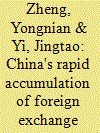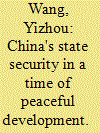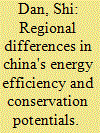|
|
|
Sort Order |
|
|
|
Items / Page
|
|
|
|
|
|
|
| Srl | Item |
| 1 |
ID:
076891


|
|
|
|
|
| Publication |
2007.
|
| Summary/Abstract |
In late February 2006, China surpassed Japan to become the world's largest holder of foreign exchange reserves. Beijing is now faced with the growing challenge of how to handle these vast reserves effectively. Although China's soaring foreign exchange reserves indicate that its overall strength has grown, they have created internal and external pressures on the balance of the economy, and introduced risks to the financial system. It is estimated in the present study that foreign exchange reserves of approximately US$ 400bn in 2005 would have been appropriate under circumstances of a managed floating exchange rate regime and capital control. China's actual reserves have far exceeded its normal demand. The objective of China is to maintain an optimal level that maximizes net benefits as a whole. Four main policy options are available for China to achieve its target: spending and investing foreign exchange reserves, gradual liberalization of the capital account, diversification of foreign exchange reserves and a switch in holders of foreign exchange reserves. Spending and investing in foreign exchange reserves can be undertaken in combination with liberalization in the capital account, given careful consideration of the risks involved. Liberalization should be extensive but gradual so that companies and individuals can adjust to changes in financial markets and manage portfolios while avoiding unnecessary risks.
|
|
|
|
|
|
|
|
|
|
|
|
|
|
|
|
| 2 |
ID:
076895


|
|
|
|
|
| Publication |
2007.
|
| Summary/Abstract |
This paper holds that China's national security during its peaceful rise is a new issue on the research agenda, which requires new counter-measures and collective wisdom. The paper discusses five of China's objectives in addressing national security; namely, from highest to lowest priority, friction among big powers, the Taiwan issue, disputes over sovereignty, protection of interests overseas, and undertaking international responsibilities. Systematically achieving these objectives is of major importance for building up national defence and China's international image. China's state security in the current period of peaceful development is a new issue on the research agendum, for politicians, the military, scholars and researchers alike. Extensive and in-depth discussion is needed. Global security commitments made by a big power might conflict with its own security interests and objectives. Judging by any standard, China's tasks are heavy and the road ahead is long
|
|
|
|
|
|
|
|
|
|
|
|
|
|
|
|
| 3 |
ID:
076892


|
|
|
|
|
| Publication |
2007.
|
| Summary/Abstract |
Financing alternatives for small and medium enterprises in China are discussed in the present study. In particular, we analyze the significant changes and developments in China s "second board" stock market. China s extensive network of regional assets and equity exchanges, which were set up to facilitate private equity transfer, and non-performing loan transactions seem to partially fill the void for small and medium enterprises, which cannot easily obtain approval for listing on the stock exchanges. Foreign investors can identify investment opportunities in non-listed domestic state-owned and private businesses through these regional assets and equity exchanges. At the same time, foreign stock markets are now attracting the young Chinese enterprises to list their stocks on their exchanges
|
|
|
|
|
|
|
|
|
|
|
|
|
|
|
|
| 4 |
ID:
076893


|
|
|
|
|
| Publication |
2007.
|
| Summary/Abstract |
Agricultural trade policy in China has been the subject of heated discussion since China's accession to the WTO. Studies have been carried out and propositions put forth regarding comparative advantage, food security, development of the industry, and farmers' income. In this paper, we attempt to provide an analysis from another important perspective: resource mobility, which is an essential assumption in free trade theory. By examining the mobility of different production resources in Chinese agriculture, namely natural resources, capital inputs, human resources and institutional arrangements, we found that for most production resources in Chinese agriculture, mobility is low. The results have significant policy implications in two respects: first, protective measures in the transitional period for certain crops in certain areas in China are legitimate and necessary to ensure social stability; and second, policy instruments to improve resource mobility in Chinese agricultural should be explored and implemented to realize more trade benefit in the future.
|
|
|
|
|
|
|
|
|
|
|
|
|
|
|
|
| 5 |
ID:
076894


|
|
|
|
|
| Publication |
2007.
|
| Summary/Abstract |
Pegging the RMB exchange rate to the Asian currency unit (ACU) has not, at least in the short term, been proved a better solution than pegging to the US dollar or pegging to a G-3 (US$, Japanese yen and euro) currency basket. Although the Asian currency unit can help Asian economies to keep the relative price of regional currencies stable, the cost of joining a formal regional monetary cooperation is the relinquishment of the autonomy of their domestic policies. Asian monetary cooperation needs to provide more potential benefits if it is to attract Asian economies. We argue that Asian monetary cooperation should be designed to solve the problem of regional trade imbalance, and regional exchange rate policy coordination should be adopted as the first step towards exchange rate cooperation
|
|
|
|
|
|
|
|
|
|
|
|
|
|
|
|
| 6 |
ID:
076896


|
|
|
|
|
|
|
|